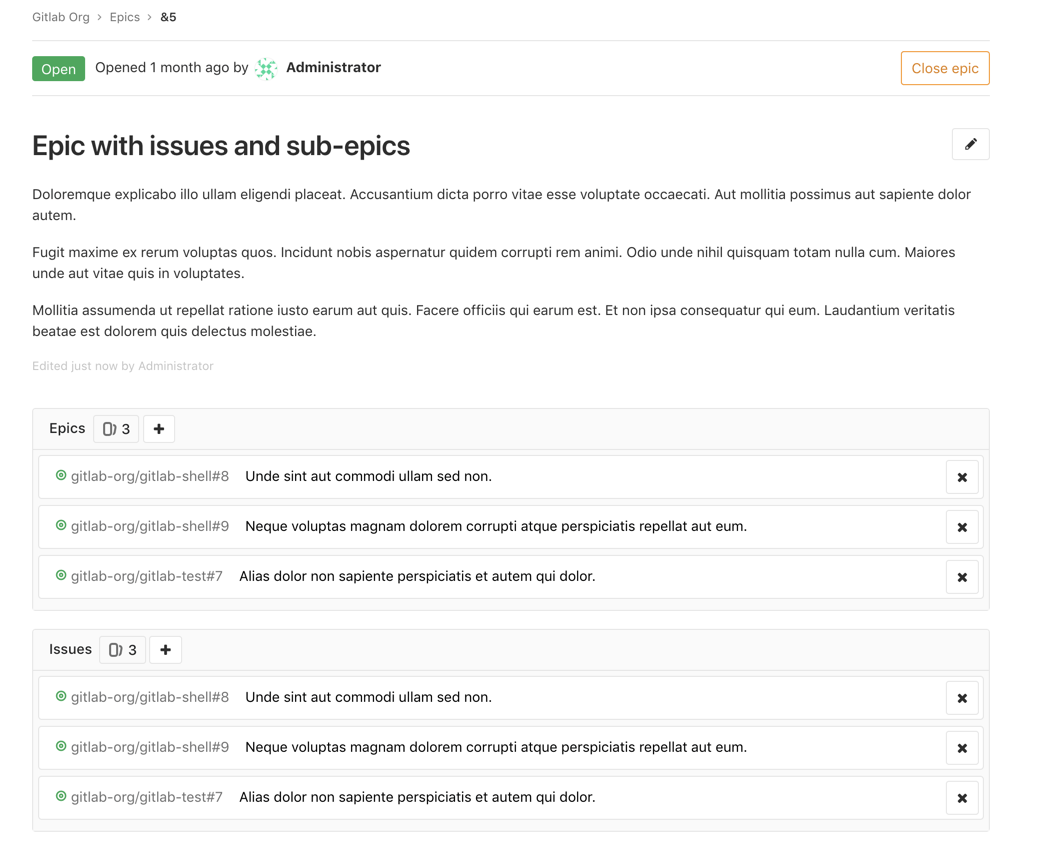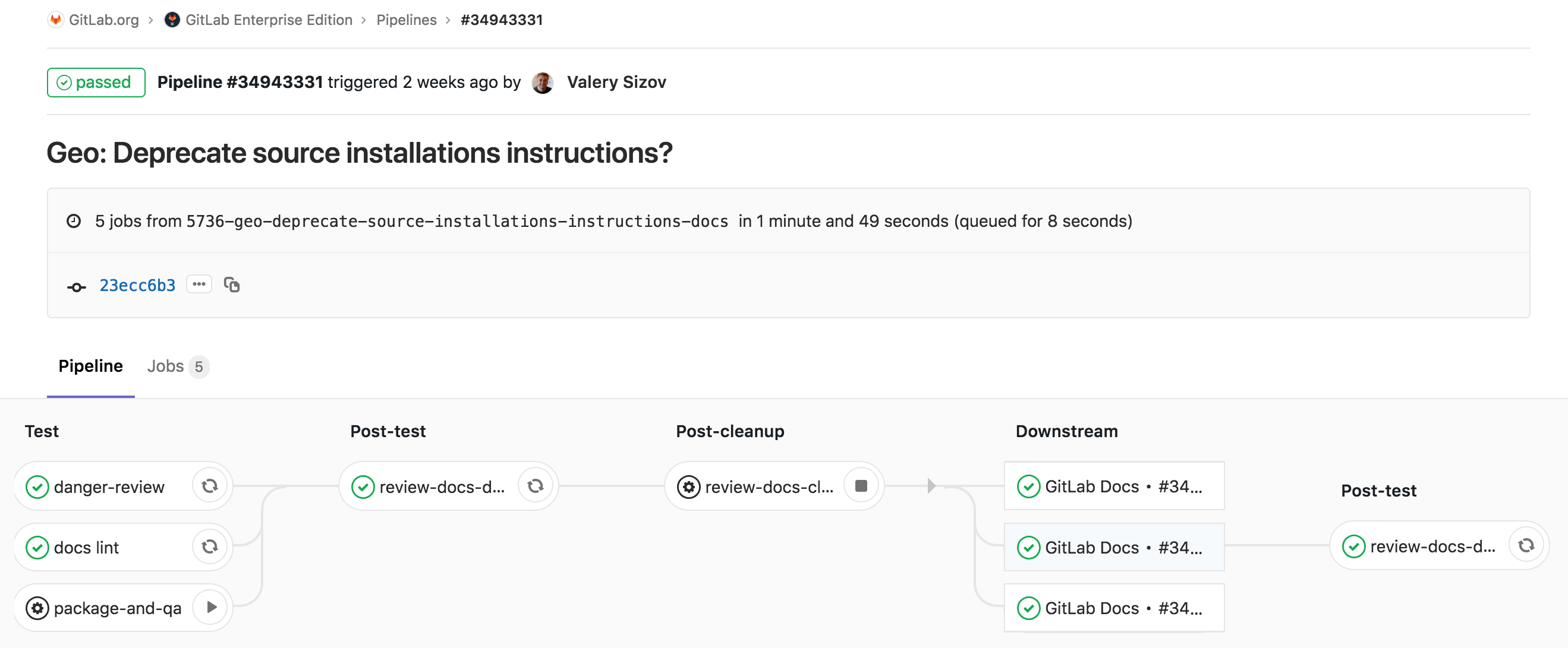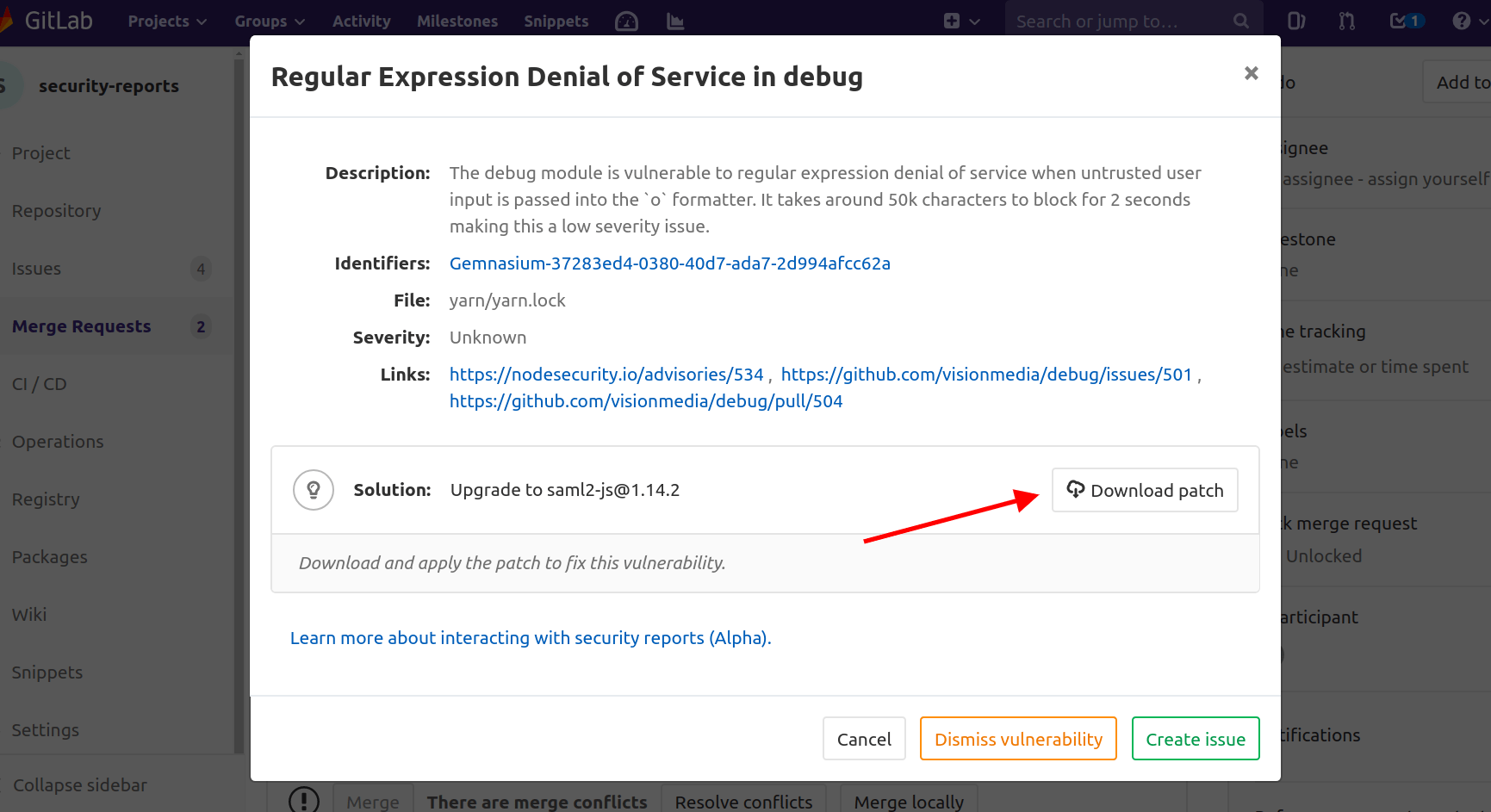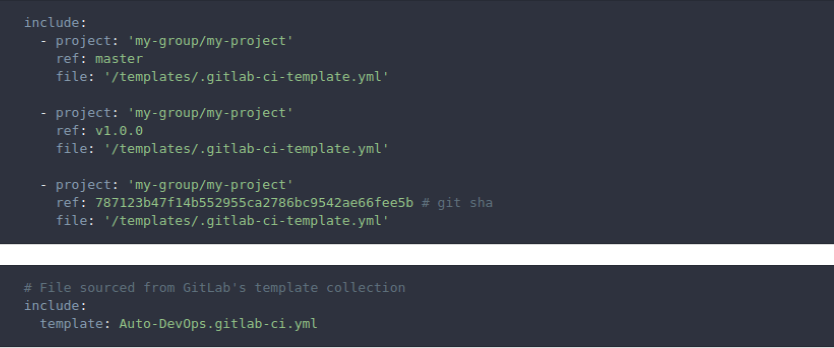GitLab 11.7 comes with Releases, Multi-level Child Epics and the NPM registry
- Transfer

Release management has become much easier.
GitLab 11.7 releases Releases in GitLab Core. Users now have release snapshots that include not only source code, but all related artifacts. You no longer have to manually collect the source code, the build output, and other metadata or artifacts associated with the released version of your code. In addition, Releases are the basis for a wider and more reliable interaction of releases in the future.
Portfolio management supports more complex work breakdown structures.
Multi-level Child Epics is the latest addition to GitLab portfolio management available in Ultimate. Child Epics allow you to create multi-level work structures, helping you manage more complex projects and work plans. Now the epic contains both tasks and epics. This structure provides a direct link between planned and implemented tasks for their implementation.
Optimizing JavaScript Development with NPM Registries
Gitlab 11.7 Premium delivers NPM registries directly to GitLab, providing a standard, more secure way to share and control NPM package versions between projects. Just share the package name, and NPM and GitLab will handle everything else in one interface!
And much more
Determining which features of our monthly releases are the main ones is a difficult choice, so let's name a couple of additional interesting features:
- Fix vulnerabilities with a correction file : As you know, GitLab security features help detect vulnerable objects. With GitLab 11.7, it will be possible to fix this vulnerability and offer a solution for Node.js projects managed with Yarn. And although this is our first official correction feature, you can be sure: this is just the beginning!
- API integration with Kubernetes : If you create many clusters or consider yourself a Kubernetes virtuoso, here’s the Kubernetes API - it will significantly reduce manual actions and make your life much easier!
- View pipeline between projects : With the ability to view pipelines between projects, you can easily find out what information is at your fingertips!
Next is the full list of features for GitLab 11.7!
Key features added to GitLab 11.7 release
Release releases for your projects
(Available in: CORE, STARTER, PREMIUM, ULTIMATE, FREE, BRONZE, SILVER, GOLD)
Our new Releases feature adds the ability to create releases in GitLab and view them on the summary page. Releases are a snapshot of the source, links and other metadata or artifacts associated with the released version of your code, and allow users of your project to easily find the latest released version of your code.
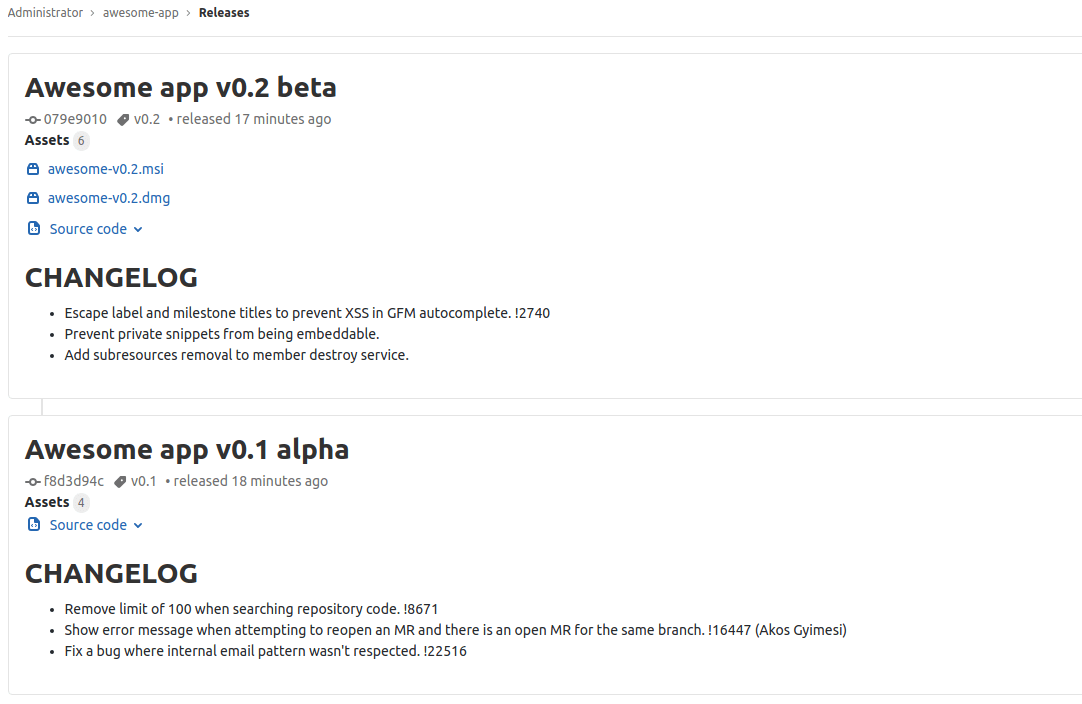
Multi-level child epics (Multi-level Child Epics)
(Available in: ULTIMATE, GOLD)
Epic and tasks work together perfectly, providing flexibility in defining long-term work plans. However, they still have a limit - they provide only a two-layer structure.
In this issue we present the child epics. Now you can have an epic containing both tasks and epics. This allows you to create multi-level work structures. Present even more long-term strategic initiatives or goals of the organization as epic high-level, and under them there will be several more levels of epic - break them into more tangible results, up to tasks.
View pipeline between projects
(Available in: PREMIUM, ULTIMATE, SILVER, GOLD)
Expand ascending or descending inter-project conveyors directly from the view of the conveyor, providing visibility of through conveyors? - regardless of which project they start or end with.
Eliminate vulnerability using correction file
(Available in: ULTIMATE, GOLD)
GitLab detects various types of vulnerabilities in your applications, and also suggests possible ways to fix them.
Starting from GitLab 11.7, you can download the correction file and apply it to your repository using the command git apply. Then send the change back to the repository, and the security dashboard will confirm that the vulnerability has disappeared! The resolution process is simpler, and the time required to deploy the solution is less. We now support dependency scanning vulnerabilities for the package manager yarn, and in order for this to work, there is no need to change anything. The patch will be available whenever possible in the vulnerability details window.
Set Kubernetes application secrets as variables
(Available in: CORE, STARTER, PREMIUM, ULTIMATE, FREE, BRONZE, SILVER, GOLD)
Operators and administrators need to configure sensitive information is carried out outside the application repository - to reduce the risk and vulnerability of confidential data. GitLab now offers the ability to configure sensitive data as environment variables that are made available to the application in the Kubernetes cluster.
Simply add to your variable K8S_SECRET_, and the corresponding CI pipeline will take your application's secret variable to fill in the secret Kubernetes.
NPM Registry
(Available in: PREMIUM, ULTIMATE, SILVER, GOLD)
JavaScript developers need a secure, standardized way to share and manage NPM package versions between projects. The NPM Registry offers developers of low-level services a way to publish their code in this way.
In GitLab 11.7, we proudly offer NPM registries built directly into GitLab. You can share a simple package naming convention for using this library in any Node.js project, and NPM and GitLab will do the rest using a single interface. This feature is available in GitLab Premium.
Here is an example of a project that collects and sends to the registry GitLab NPM. Simple as that!
API support for integration with Kubernetes
(Available in: CORE, STARTER, PREMIUM, ULTIMATE, FREE, BRONZE, SILVER, GOLD)
In this release, we added API support to our integration with Kubernetes. All actions that are currently available in the graphical interface: such as enumerating, adding and deleting a Kubernetes cluster, are now available via the API. Teams use new functionality to create a cluster as part of their workflow.
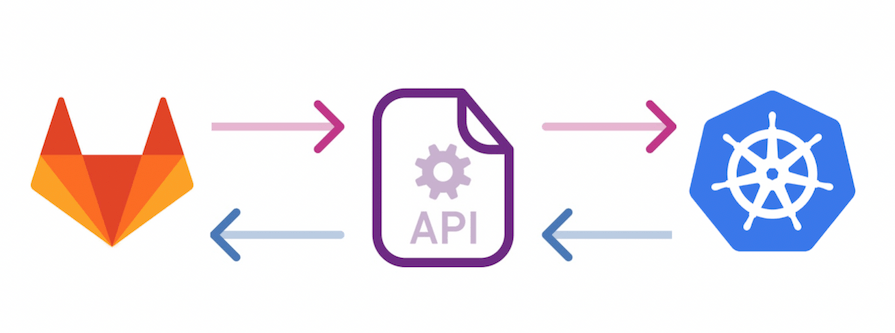
Other improvements in GitLab 11.7
Search filter field to navigate the task board
(Available in: STARTER, PREMIUM, ULTIMATE, BRONZE, SILVER, GOLD)
Teams often use a lot of task boards for a particular project or panel. This makes it difficult to navigate the drop-down list - if the list is very long. In this release, we present a search filter. Just enter a few characters in the filter field to quickly narrow down the list of tasks that interest you.
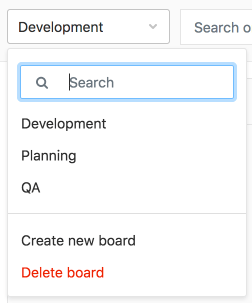
Project List Redesign
(Available in: CORE, STARTER, PREMIUM, ULTIMATE, FREE, BRONZE, SILVER, GOLD)
Projects are full-fledged residents of GitLab, and we want to make project lists visually pleasing and convenient for analysis.
In GitLab 11.7, we presented a user interface redesign for a list of projects: a special focus on readability and a brief description of the project’s activities. We provided each line of the project with additional project information and spaces, and we will continue the design iteration based on feedback.
Universal mailbox support, including Microsoft Exchange and Google Groups, for incoming email features
(Available in: CORE, STARTER, PREMIUM, ULTIMATE, FREE, BRONZE, SILVER, GOLD)
GitLab has some great features that use incoming email. For example, an e-mail response , a new e-mail task , a new merge-request e-mail and a support service . Previously, these functions could be used only by using an email server configured for sub-addressing.
GitLab now supports subaddressing and intercepting email accounts using the new email format, which allows you to use more email servers with GitLab, including Microsoft Exchange and Google Groups (which do not support subaddressing).
Import CSV Tasks
(Available in: CORE, STARTER, PREMIUM, ULTIMATE, FREE, BRONZE, SILVER, GOLD)
Often teams, starting to use GitLab, use different tools and outdated data. You may be using Jira right now, but would like to move on to GitLab tasks.
Now the transition has become easier. Many problem tracking systems allow for the export of CSV, so import such export of tasks into GitLab - this will allow you to continue to manage existing work, importing obsolete data into GitLab, and, as necessary, search and retrieve. This will work with Jira or any task tracking system that generates a CSV export.
GitLab also has the function to export to CSV .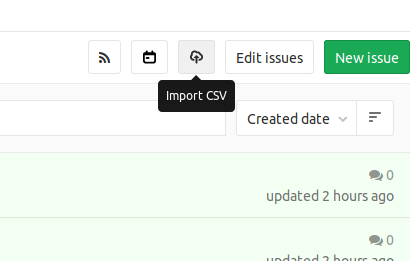
SHA short commit available as environment variable
(Available in: CORE, STARTER, PREMIUM, ULTIMATE, FREE, BRONZE, SILVER, GOLD)
Git SHA are 40-character pointers to specific objects (ie, commits) in the Git repository. Often, displaying the full string is cumbersome, and I want to show the first eight characters as a quick (although not guaranteed unique) link. For this purpose, we added the environment variable CI_COMMIT_SHORT_SHAto the CI pipeline, which will give you the first part of the SHA commit you are creating.

More stringent restrictions on self-assertion
(Available in: STARTER, PREMIUM, ULTIMATE, BRONZE, SILVER, GOLD)
Code verification is the essential practice of every successful project, and it should not be the change author. By default, the self-assertion of merge-requests is not allowed, but the criterion for the ban is not the commit in the merge-request, but the authorship of the request.
Beginning with GitLab 11.7, these restrictions also prevent the authors from approving their own changes in Merge Requests. So the changes created by several engineers receive completely independent code reviews and approvals.
Authorization support for sampling inclusions
(Available in: CORE, STARTER, PREMIUM, ULTIMATE, FREE, BRONZE, SILVER, GOLD)
When you include external files in a pipeline definition using a keyword include, they are selected using HTTP / HTTPS requests. Now you can access yamls in another project without open access (for example, a private project on GitLab.com) using credentials with which the pipeline works.
Vulnerability Filter in Group Security Panel
(Available in: ULTIMATE, GOLD)
The group security panel allows security teams to keep everything under control, revealing vulnerabilities that affect their groups.
Using GitLab 11.7, filter the displayed vulnerabilities by severity, report type, and project name. Thanks to this ability, you can focus on what you need and quickly access your data, which is especially useful when there are a lot of records in the list.
Show dependency scan results in group security panel
(Available in: ULTIMATE, GOLD)
The group security panel was originally released only with SAST results , so users could not manage other types of vulnerabilities using this feature.
With GitLab 11.7, dependency scan results are added to the set of available data . If you are already using the new report syntax , you will automatically see the results in the information panel. The Auto DevOps template has also been updated, and now GitLab Runner 11.5 or higher is required to correctly execute the dependency scanning job .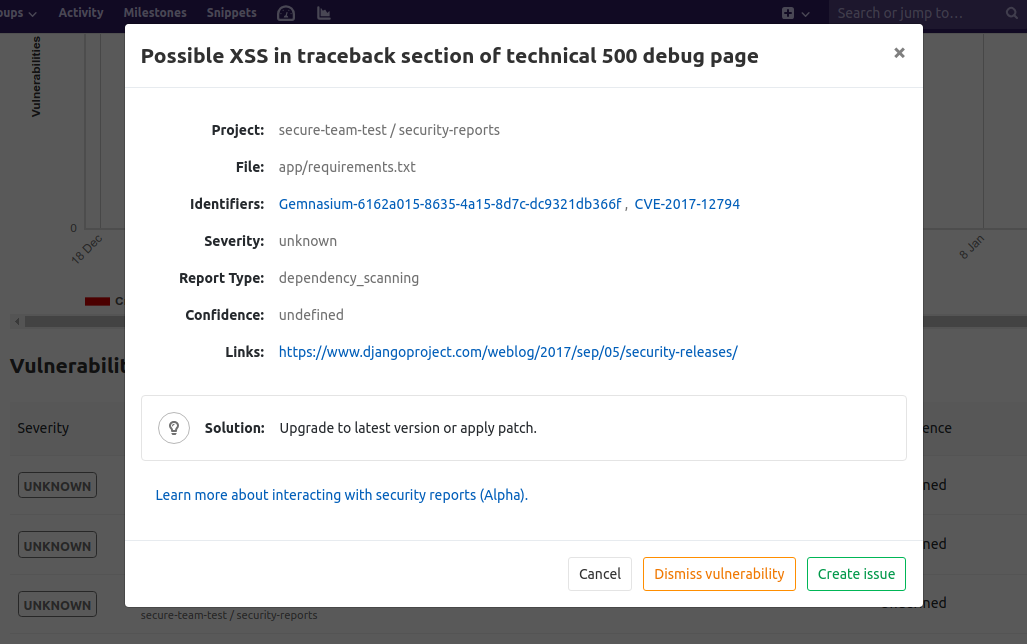
Include CI / CD files from other projects and templates
(Available in: CORE, STARTER, PREMIUM, ULTIMATE, FREE, BRONZE, SILVER, GOLD)
The keyword includeallows users to dynamically create CI / CD pipelines, including external files in the configuration. Previously, this was possible only for files in the project repository or for remote files downloaded via HTTP.
With GitLab 11.7, include your configuration snippets also from other projects and from predefined templates. GitLab will include fragments for specific jobs, such as sastor dependency_scanning, so users can reference them, rather than copying the current definition. Tasks will be automatically updated to the latest version with GitLab, so you don’t need to change anything manually.
Default RBAC mode for creating Kubernetes cluster
(Available in: CORE, STARTER, PREMIUM, ULTIMATE, FREE, BRONZE, SILVER, GOLD)
Without Kubernetes cluster protection, it is impossible to control and restrict access to the cluster, as well as to determine which actions are allowed in it.
Starting from GitLab 11.7, all clusters at the time of creation will support RBAC by default, providing a more secure and secure infrastructure.
Support for private Go packages in subgroups
(Available in: CORE, STARTER, PREMIUM, ULTIMATE, FREE, BRONZE, SILVER, GOLD)
Go packages that are hosted in GitLab can be installed using go get, but this feature was not supported by private projects in subgroups. Starting from GitLab 11.7, any project can be used as a Go package, including private projects in subgroups.
Private packages are supported by a command go getusing a file .netrcand using a personal access token in the password field.
Thanks to Morthochey for the contribution!
Support for NGINX Ingress 0.16.0+ metrics
(Available in: CORE, STARTER, PREMIUM, ULTIMATE, FREE, BRONZE, SILVER, GOLD)
With the release of NGINX Ingress 0.16.0, Prometheus metrics are now built in initially , rather than dependent on an external exporter.
GitLab 11.7 now includes support for metrics exported by NGINX Ingress 0.16.0+, and automatically detects and displays throughput, latency, and deployment error rates.
GitLab Runner 11.7
(Available in: CORE, STARTER, PREMIUM, ULTIMATE, FREE, BRONZE, SILVER, GOLD)
Today we also released GitLab Runner 11.7! GitLab Runner is an open source project for running CI / CD jobs and sending the results back to GitLab.
The most interesting changes :
- Cancel a web terminal session when canceling a build
- Fix the path delimiter for CI_PROJECT_DIR in Windows
A list of all changes can be found in the change log of GitLab Runner: CHANGELOG .
Skip the CI build during git push
(Available in: CORE, STARTER, PREMIUM, ULTIMATE, FREE, BRONZE, SILVER, GOLD)
If you do not need to start the CI / CD pipeline, you could add a note to the commit message with [ci skip]or in commits [skip ci]. However, many users do not want or can not change their commit messages so that they contain additional information.
Starting from GitLab 11.7, users can use the Git push options in Git 2.10 or newer when sending to GitLab to prevent the pipeline from running for their push notifications. Use git push -o ci.skipwill now allow you to achieve the same goal without any changes in the commit message.
Thanks to Jonathon Reinhart for making a contribution!
Performance improvement
(Available in: CORE, STARTER, PREMIUM, ULTIMATE, FREE, BRONZE, SILVER, GOLD)
We continue to improve GitLab performance with each release for GitLab instances of any size.
In GitLab 11.7, we have significantly improved the performance of the Merge Requests review by caching the syntax of the selected discussion differences .
Other noteworthy performance improvements include:
- Improving the performance of push notifications by skipping preliminary checks that were passed to other branches
- Removing unnecessary counters in the search for fragments
- Acceleration of the opening of the list of forums in the presence of lists of assigns
Omnibus Improvements
(Available in: CORE, STARTER, PREMIUM, ULTIMATE)
GitLab 11.7 includes the Mattermost 5.6 , an open source alternative to Slack , the latest version of which contains interactive message dialogs, new administrator tools, support for the Ukrainian language, and much more.
Now for official GitLab AMI images , extended network support is available , which allows using additional types of instances and increasing bandwidth.
Debian 7 Wheezy Support
GitLab 11.7 will be the latest release with support for Debian 7 Wheezy.
Debian Wheezy is no longer supported by the Debian project since May 2018 .
Date of deletion: January 22, 2019 .
Raspbian Jessie Support
GitLab 11.8 will be the latest release with support for Raspbian Jessie.
Jessie switched to LTS , and the last Raspbian Jessie image is over a year old. We encourage users to upgrade to Raspbian Stretch .
Date of deletion: February 22, 2019
CentOS 6 support for GitLab Runner
GitLab 11.9 will be the latest release with runner support for CentOS 6, because we plan to upgrade to a more current Docker library, which no longer supports them. For details, see this task .
Date of deletion: March 22, 2019
Prometheus 1.x support in Omnibus GitLab
Starting with GitLab 11.4 , the embedded version of Prometheus 1.0 is not included in Omnibus GitLab. From this point on , Prometheus 2.0 is used , the format of which is incompatible with version 1.0. Existing versions can be upgraded to 2.0 and, if necessary, transfer data using the built-in tool .
In GitLab version 12.0, Prometheus 2.0 will be automatically installed if the update has not yet been performed. Data from Prometheus 1.0 is not transferred and will be lost.
Date of deletion: June 22, 2019
TLS v1.1 will be disabled by default in version 12.0
Starting with GitLab 12.0 , TLS v1.1 will be disabled by default for increased security. This eliminates numerous problems, including Heartbleed, and makes GitLab native in its original state with PCI DSS 3.1.
To immediately disable TLS v1.1, install nginx ['ssl_protocols'] = "TLSv1.2"in gitlab.rbandand run gitlab-ctlconfigure.
Date of deletion: June 22, 2019
OpenShift template for installing GitLab
The official gitlabhelm diagram is the recommended method of GitLab on Kubernetes, including deployment to OpenShift .
The OpenShift template for installing GitLab is outdated and will no longer be supported in GitLab 12.0.
Date of deletion: June 22, 2019
GitLab Geo will provide hash storage in GitLab 12.0
GitLab Geo requires hashed storage to mitigate race fronts on subordinate nodes. This was noted in gitlab-ce # 40970 .
In version 11.5, we added this requirement to the Geo documentation: gitlab-ee # 8053 .
In version 11.6 itsudo gitlab-rake gitlab: geo: check checks whether the hashed storage is enabled and whether all projects are migrated: gitlab-ee # 8289 . If you are using Geo, please run this check and migrate as soon as possible.
At 11.8, the gitlab-ee warning is constantly disabled ! 8433 will be displayed on the “Admin Area› Geo ›Nodes” page if the above checks are not allowed.
At 12.0 Geo will apply the hash storage requirement: gitlab-ee # 8690 .
Date of deletion: June 22, 2019
Google OAuth2 SSO is supported only in GitLab 11.7+
March 7, 2019 Google closes all Google+ APIs. Read more about the announcement from Google here .
Since GitLab versions up to 11.7 use these APIs for Google OAuth2, Google single sign-on will not work in these versions anymore. GitLab 11.7 and above will support Google SSO .
If your instance uses Google OAuth2 for authentication, we recommend upgrading it to 11.7 .
Date of deletion: March 7, 2019
Developers can remove Git tags in GitLab 11.9
Editing / deleting Git tags in unprotected branches has historically been limited to maintainers and owners .
Since developers can add tags, as well as change and delete unprotected branches, developers should be able to modify and delete Git tags. In GitLab 11.9, we make this change to our permissions model — to improve workflow and help developers make better and more efficient use of tags.
Date of deletion: March 22, 2019
Hipchat Integration
Hipchat will be terminated . Therefore, we remove the existing GitLab Hipchat integration feature as part of the 11.9 release .
Date of deletion: March 22, 2019
Update barometer
To upgrade to GitLab version 11.7 from the latest version 11.6, stopping work is not required. Check the documentation for updates without downtime .
Migrating the database in this release can take from 30 to 60 minutes for instances that are similar in size to GitLab.com. For smaller instances, the total time should not exceed approximately 15 minutes.
We recommend that users of GitLab Geo consult the Geo update documentation .
List of changes
Refer to the list of changes to view all changes:
Installation
If you are setting up a new GitLab installation, see the GitLab download page .
Update
Check out our update page .
GitLab Subscription Plans
GitLab is available in two versions: self-managed and as a cloud service (SaaS) .
Self-Managed : Deploy locally or on your favorite cloud platform.
- Core : For small teams, personal projects or testing GitLab with unlimited time.
- Starter : For teams whose members are in the same place and engaged in a small number of projects that need professional support.
- Premium : For distributed teams that require advanced features, high availability and 24/7 support.
- Ultimate : For businesses that want to align their strategy and project execution with enhanced security and compatibility requirements.
SaaS cloud service - GitLab.com : supported, managed and administered by the GitLab team; possible free and paid subscription for individuals and teams.
- Free : Unlimited private repositories and unlimited number of employees in the project. Private projects get access to Free features , open projects get access to Gold features .
- Bronze : For teams that need access to more advanced workflow features.
- Silver : For teams that need more reliable DevOps capabilities, compatibility and faster support.
- Gold : Best when there are a large number of CI / CD pipeline jobs. Team members of each public project can use Gold features for free, regardless of their subscription plan.

